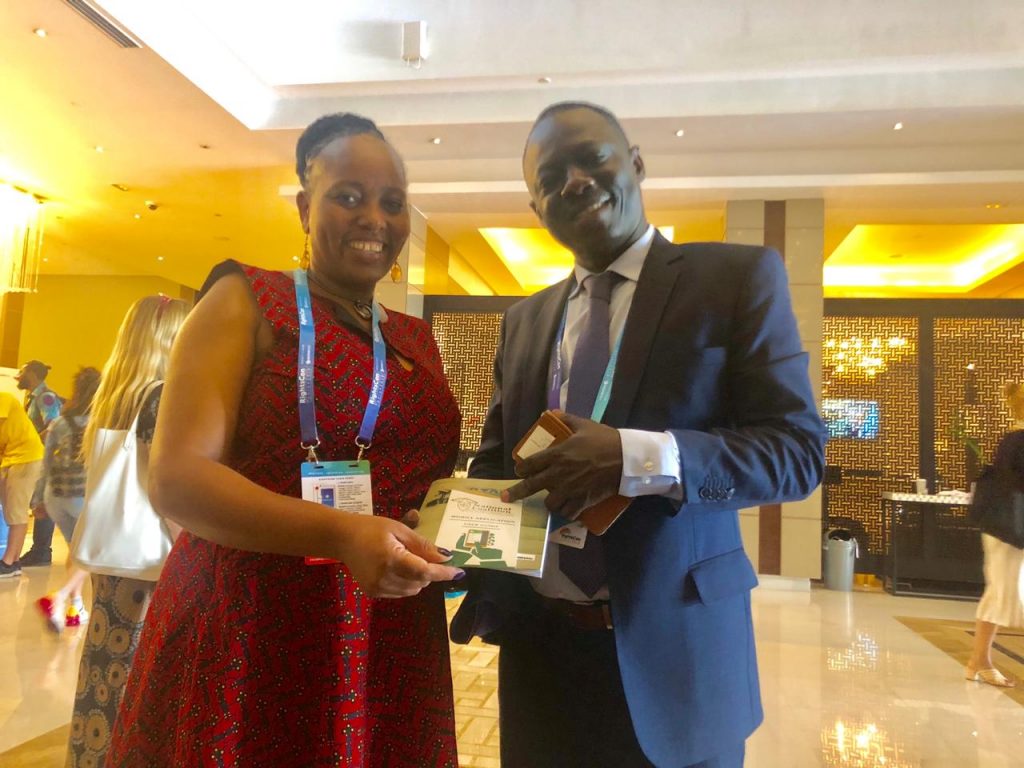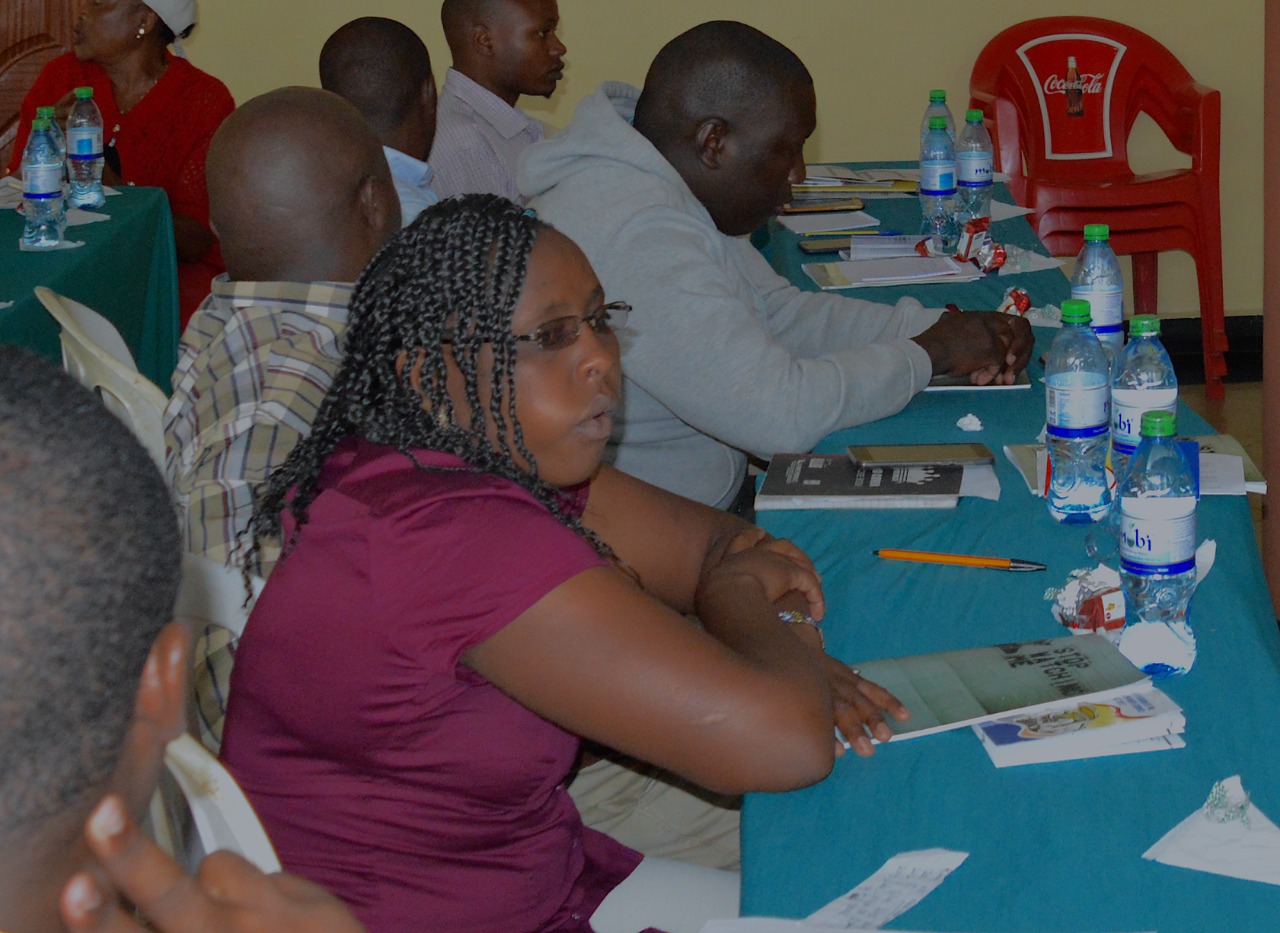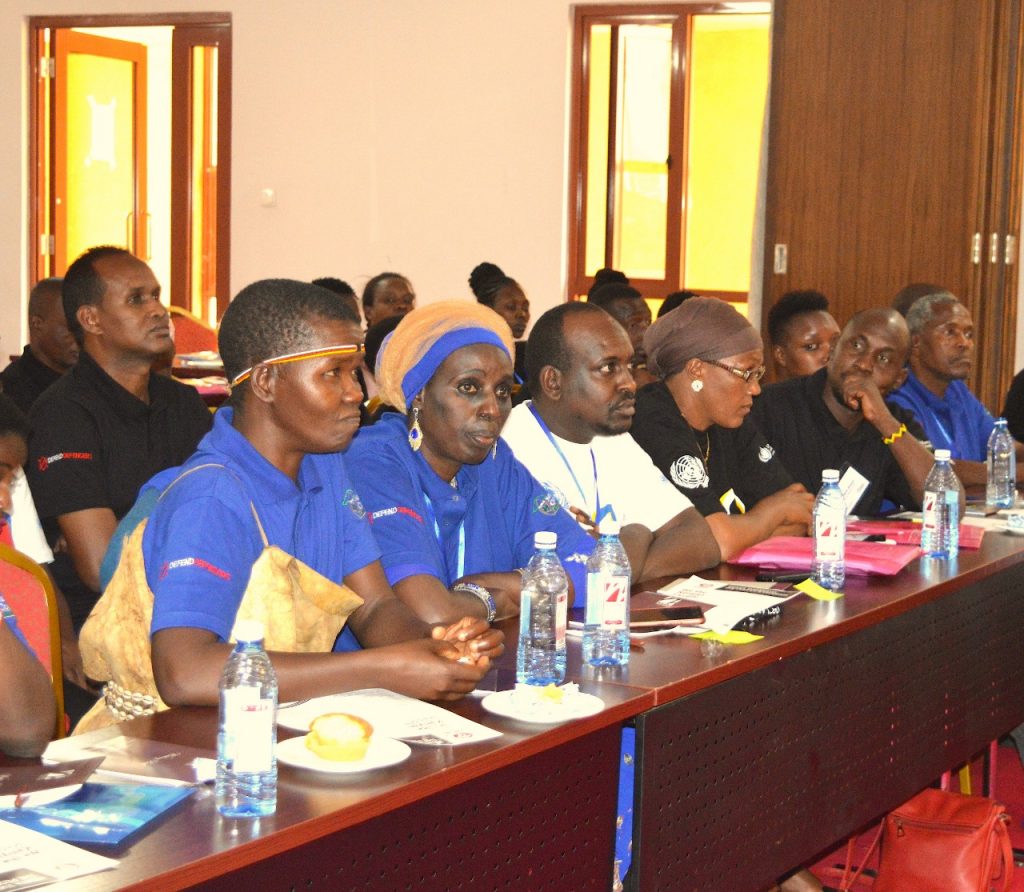19th June 2019
Nairobi, Kenya
The National Coalition of Human Rights Defenders – Kenya (NCHRD-K) strongly condemns the arrest of two Human Rights Defenders (HRDs), Davis Malombe and Julius Kamau, who were taking part in a peaceful demonstration, (#IAmTheSudanRevolution) in solidarity with the people of Sudan, calling an end to the mass atrocities being committed by the Sudanese Armed Forces and the Transitional Military Council (TMC) .The constitution of Kenya Article 37 clearly encourages the Rights and fundamental freedoms of assembly, and demonstration.
In the last one month, the people of Sudan have been subjected to brutal crackdowns on peaceful demonstrators, sexual violence for both women and men, media and internet shutdown amongst others. Human Rights Defenders and the public drawn from the most African and West African countries have come together to form the #Africans4Sudan movement to help lobby the governments and African and International Bodies to exert pressure on the Sudanese military to ensure a civilian led transitional authority established.
NCHRD-K is concerned with the growing disregard of notifications to demonstrate, by security agents in the country. On 14th June 2019, HRDs had notified the OCS central police station about the demonstration and requested for security. The arrest comes barely two months after the arrest of Kenyan Activist Beatrice Waithera on 30th April 2019 while participating in an anti-corruption protest in Nairobi. NCHRD-K is also concerned with the threats to curtail the freedom of association by the various government officials including through legislation.
We therefore call for:
Signed
Kamau Ngugi,
Executive Director, National Coalition of Human Rights Defenders Kenya
For more information or to arrange for interviews contact |Francis Ndegwa| francis@hrdcoalition.org| 0721443397 | Communications Officer at NCHRD-K
Although democratic and governance structures in Southern and East Africa unquestionably have transformed since the advent of multi-party democracy, true political inclusion remains an aspiration and not an achievement. This is evident from the increasing suppression by the State of civil and political rights such as the right to freedom of assembly and related rights to freedom of information and expression.
Moreover, more than ever we see in the region the importance of understanding the inter-sectional nature of rights violations, where those whose socio-economic rights are violated, also experience the violation of their civil and political rights. People who have no or limited access to socio-economic rights are usually denied their civil and political rights.
People living in poverty, for example, are usually arrested for protesting against the lack of water and sanitation; mineworkers, protesting economic ‘unfreedom’, are killed by police for ‘unlawful’ gatherings; students living in poverty are tear-gassed for demanding the right to education.
PRESS STATEMENT
2nd May 2019
The Police Reforms Working Group-Kenya would like to strongly condemn the gruesome murders of Kamaindi Location Chief Japheph Mayau Mukengu and the Chuka Officer in Charge of Police tation Mr Joshua Kinyua.
According to media reports, Chief Mayau was hacked to death by angry locals from Kamaindi who allegedly accused him of killing his neighbor in 2018, detaining goats of a local after they had grazed on his farm and diverting water from the drying River Thuci to their land at the expense of those living downstream.
OCS Kinyua was in the company of twelve other police officers and had gone to effect the arrests of one of the suspects who they had traced at Ugweri trading center in Embu. The suspect raised an alarm attracting a crowd, forcing the police to shoot in the air. As the police dispersed the crowd, the suspect hacked Kinyua, who later succumbed to his injuries.
We call upon the National Police Service (NPS) and specifically the Directorate of Criminal Investigations (DCI), including the Independent Policing Oversight Authority (IPOA) to investigate the incident that also saw an alleged shooting to death of a resident by the police.
We acknowledge the swift response and action of the Government to deploy more security officers assist with maintaining law and order as these unfortunate incidents being investigated. In doing so, we call upon security personnel involved in the operations to work within the confines of the law and with respect to the 6th Schedule of the National Police Service Act 2011 on the use of force.
We strongly differ with the views of the Eastern Regional Commander Ms Eunice Kihiko who has allegedly condemned the entire community. We caution that her remarks may lead to collective punishment and unwarranted use of excessive force by the Police. No matter the justification, there should be other avenues of conflict resolution instead of attacking chiefs or police officers. There should be effective complaints and redress mechanisms that aggrieved civilians can use to channel their grievances and seek justice whenever they feel wronged by government officers and the police.
We call on the locals in Kamaindi to cooperate with and share any relevant information with security personnel investigating these unfortunate incidents.
…………………………………ENDS…………………………………
Signed by Members:
National Coalition of Human Rights Defenders Kenya (NCHRD-K)
Independent Medico-Legal Unit (IMLU)
Kenya Human Rights Commission (KHRC)
International Centre for Transitional Justice (ICTJ-K)
International Commission of Jurists –Kenya (ICJ-K)
Legal Resources Foundation (LRF)
International Jurists Mission (IJM)
Kenya National Commission on Human Rights (KNCHR)
Rights Promotion and Protection Centre (RPP)
Federation of Women Lawyers in Kenya (FIDA-K)
Coalition on Violence against Women (COVAW)
Kenyans For Peace, Truth and Justice (KPTJ)
Usalama Reforms
Amnesty International – Kenya
Transparency International – Kenya
Katiba Institute (KI)
Peace Brigade International (PBI)
The Institute for Social Accountability (TISA)
No medical facility or police officer should charge you to obtain a P3 form. The Court in its ruling noted that the Poliuce Charter states P3 as a free document. It has further been established that there are some police stations who are in compliance with the charter and give the form free of charge.
As for the health facilities run by the national and the county governments, some charge for filling, the P.3 form while some do not. The same facilities issue the Post Rape form free of charge whose purpose is complementary to that of the P.3 form to assist victims of rape and assault in their evidence in their criminal cases. The post mortem report in murder cases, the P.3 form for mental assessment and other forms are supplied by the state and the county governments free of charge.
The High Court made the following declarations:
1.That a declaration do hereby issue that the respondents are jointly and severally in violation of the basic principle of access as to justice in levying of fees for issue and for filling of the Medical Examination Form popularly known as P.3 form.
2. That a declaration do hereby issue that the Medial Examination Form, that is the P.3 form or any form required or issuable to victims of crime is free of charge and that no levy shall be imposed.
3. That an order of prohibition do hereby issue prohibiting the respondents, their agents or any medical officers in charge of public health facilities at both levels of government from levying fees for issue or for filling of the Medical Examination Forms (P.3s).
Constitutional Petition No. 440 of 2013)
JUDGMENT OF ASIKE MAKHANDIA. TA, Court of Appeal, Nairobi
Article 1 of the Universal Declaration of Human Rights (UDHR) is in the context of this case apt. It neatly sums up what lies at the core of this appeal. This Article recognizes that all human beings are born free and equal in dignity. Thus, strip someone of their dignity and you strip off their essence of being a human being.
Dignity since the beginning of the era of human rights has become the foundation of all other rights. It amounts to the recognition that the sole purpose for protecting , promoting and fulfilling human rights is the acknowledgement that all human beings must be accorded respect.
The concept of dignity for all men and women involves the development of opportunities which allow people to realize full human potential within positive social relationships. It is the quest for dignity, equality and equal recognition and protection before the law that made the respondent in this appeal file the petition, subject of this appeal in the High Court.
Download the entire judgement here: https://defenderscoalition.org/wp-content/uploads/2019/08/NGO-Board-v-Gitari-Makhandia.pdf
In a resolution (A/HRC/40/L.22/Rev.1) on recognizing the contribution of environmental human rights defenders to the enjoyment of human rights, environmental protection and sustainable development, , the Council expresses grave concern at the situation of environmental human rights defenders around the world, and strongly condemns the killing of and all other human rights violations or abuses against environmental human rights defenders, including women and indigenous human rights defenders, by State and non-State actors; and calls upon States to take appropriate, robust and practical steps to protect women human rights defenders and to integrate a gender perspective into their efforts to investigate threats and attacks against human rights defenders.
Environmental human rights defenders contributed to making societies better, and should be seen as an asset, not a threat. Their aim was to recognize the important role played by environmental human rights defenders in society. The resolution was a comprehensive text reached via comprehensive and rich discussions with States and representatives from civil society. Broad support across regions would play an important role in implementing the resolution. As such, they had held five informal consultations, as well as numerous discussions of views. The main elements of the resolution continued to confirm the importance of action to implement the 1998 Declaration on Human Rights Defenders. It also called on States to refrain from actions that hindered their work, including reprisals or violence.
To empower environmental human rights defenders, actions were needed in a number of areas, including developing effective development mechanisms. Indigenous peoples, those living in rural areas, marginalized communities, as well as women human rights defenders faced particular challenges that needed consideration. The resolution also recognized the responsibility of business enterprises in respecting such human rights.
Read more about the resolution here: https://www.ohchr.org/EN/NewsEvents/Pages/DisplayNews.aspx?NewsID=24389&LangID=E
A defender is characterized by the activity of promoting and protecting human rights. In answering the question ‘Why Focus on WHRDs, the report provides a starting point on the understanding of the challenges faced by WHRDs in Kenya in the course of their human rights work and the reasons why WHRDs in Kenya face these challenges in the course of their human rights work.
Women Human Rights Defenders, who put themselves on the front line in the promotion and protection of human rights, are subject to the same types of risks faced by their male HRDs, but as women, they are also targeted for or exposed to gender-specific violence and violations that have gendered consequences.
Violations that have gendered consequences refers to violations that are experienced by both male and female defenders, but may have different consequences for WHRDs because different social and cultural norms govern the gender identity, sexuality, and gender role of women in different
contexts. For instance, arbitrary arrest or detention of WHRDs adds an additional threat of sexual assault or violence when in custody.
Access the fact sheet for this report here: https://defenderscoalition.org/wp-content/uploads/2019/08/Gendered-Risk_-Challenges-WHRDs-Face.pdf
Job
Senior Program Officer, Sexual Health and Rights (Africa)
Location of Position
New York, NY, Kenya, or Uganda
Reporting Relationship
Director, Sexual Health and Rights
ABOUT AJWS
American Jewish World Service (AJWS) is the leading Jewish organization working to pursue justice and fight poverty in the developing world. By supporting hundreds of social change organizations in 19 countries, we respond to the most pressing issues of our time—from disasters, genocide and hunger, to the persecution of women and minorities worldwide. With Jewish values and a global reach, AJWS is making a difference in millions of lives and bringing a more just and equitable world closer for all.
OVERVIEW OF DEPARTMENT
AJWS works to increase access to services and end discrimination, violence and abuse of women, girls, lesbian, gay, bisexual, transgender and intersex (LGBTI) people and sex workers, so that they can access the full spectrum of opportunities in society and live in health, safety and dignity.
OVERVIEW OF POSITION
The Senior Program Officer (SPO) manages AJWS’ dynamic sexual health and rights grantmaking in Africa, coordinates capacity-building and programmatic opportunities for in-country staff and grantees, coordinates with other funders, and engages in strategic learning and evaluation in order to document AJWS’s impact and to improve grantmaking strategies, with a specific focus on Uganda, Kenya and Liberia. The SPO collaborates closely with country consultants and the Director of Sexual Health and Rights to develop and implement strategy in sexual health and rights. The SPO seeks strategic opportunities for partnership and collaboration that leverage AJWS’s grantmaking and promote the work of grantees, develops initiatives that advance AJWS and grantees’ work, and contributes to funder affinity groups and networks to deepen knowledge in the field.
The ideal candidate will have a proven record as a strategic grantmaker or related activism and advocacy in the field of sexual health and rights, with experience working in East and/or West Africa and in-depth knowledge of the legal, political, social and economic contexts in the region. S/he must also have a keen understanding of how local activists need to partner with national and global activist networks to create impactful change.
Responsibilities include but are not limited to:
Qualifications
Compensation and Benefits Information:
Additional Considerations:
People of color; lesbian, gay, bisexual, intersex, trans and gender non-conforming people; women; and differently abled people are encouraged to apply. We also encourage applications from people of diverse religious, spiritual and cultural backgrounds.
All candidates must have legal work authorization in US, Kenya or Uganda.
How to Apply:
For immediate consideration, please email your resume and cover letter to AfricaSHRCareers@ajws.org
Deadline to apply is January 28, 2019.
We thank you for your interest in career opportunities with AJWS. Due to high volume, only those candidates selected for an interview will be contacted.
AJWS is an equal opportunity employer and provides competitive salaries and benefits
Front Line Defenders is currently accepting nominations for the 2019 Front Line Defenders Award for Human Rights Defenders at Risk.
As 2019 marks the 50th anniversary of the seminal Stonewall uprising which led to the global movement of LGBT+ Pride marches, the 2019 Front Line Defenders Award will prioritise honouring the work of human rights defenders (HRDs) at risk working to defend and advance the rights of the LGBT+ community.
The annual Front Line Defenders Award was established in 2005 to honour the work of HRDs who are courageously making outstanding contributions to the promotion and protection of the human rights of others, often at great personal risk to themselves. The Award focuses international attention on the HRDs work, providing them with a greater national and international platform to speak about and advocate for their work.
From an open nomination process, 5 HRDs will be identified as regional award winners for Africa, the Americas, Asia, ECA and the MENA and from these 5 regional winners, an overall global Award laureate will be identified by a jury of Irish and European parliamentarians.
If you would like to nominate a HRD working on LGBT+ rights for the 2019 Front Line Defenders Award for Human Rights Defenders at Risk, please follow this link to the secure online nomination form: 2019 Front Line Defenders Award – Nomination Form
Please note that the nomination process will remain open until midnight (12am GMT) on Friday, 5th January 2019.
The right to privacy is a fundamental right protected in law across the world including Kenya as stipulated in the Bill of Rights in the 2010 Constitution. It is essential to the protection of human dignity and serves as the foundation upon which many other rights are built. Privacy denotes “that area of individual autonomy in which human beings strive to achieve self realization … alone or together with others.”
Human rights work demands use of communication tools ranging from face-to-face, telephones and e-mails and short message services (SMS). All these provide varied degrees of risk, which are also specific to the work the HRDs are engaged in, as well as contexts. Numerous Kenyan HRDs have raised concerns about their mobile phones being tapped and their communication intercepted.

These experiences have implications for HRDs and, therefore, it is essential to ensure that HRDs are not the subject of unlawful surveillance practices and that they are able to do their work without fear of snooping by anyone.
This report analyses the needs, concerns and areas of interest for HRDs in relation to privacy, data protection and communications surveillance. It also establishes how surveillance impacts HRDs work and their role as actors of change in society. Examining the risk levels based on these specifics as well as finding the best-suited measures will be important for continued HRDs protection.

This survey set out to:
• Assess HRDs’ level of exposure, understanding, and perception of communication surveillance;
• Document HRDs’ current strategies for mitigating, perceived or actual communication
surveillance.
 HRDs attend a class on Right to Privacy during the 2018 Human Rights Defenders Academy.
HRDs attend a class on Right to Privacy during the 2018 Human Rights Defenders Academy. See the Fact Sheet of the Research here: https://defenderscoalition.org/wp-content/uploads/2019/08/A-Perception-Survey-on-Communication-Surveillance.pdf